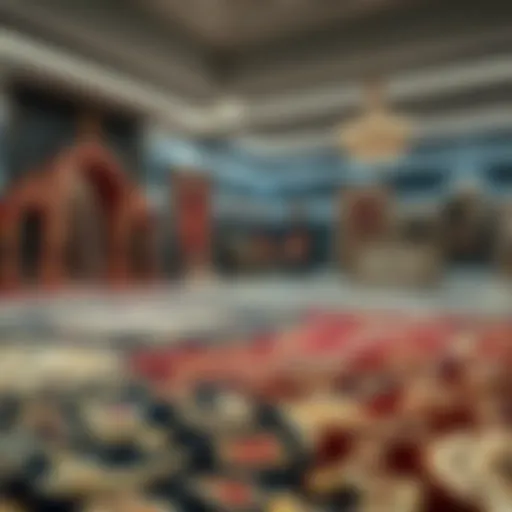Discovering New Homes in Dubai's Real Estate Market
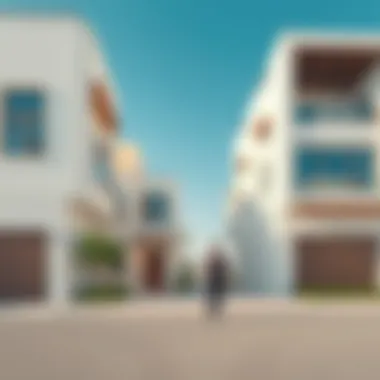

Intro
Dubai, a city that's become synonymous with luxury and ambition, has seen its real estate market evolve in remarkable ways. Understanding this landscape is essential for anyone looking to invest or settle in this vibrant metropolis. You’re likely to encounter stunning skyscrapers, expansive communities, and a variety of housing options that cater to a diverse demographic.
From swanky apartments with views of the Burj Khalifa to cozy townhouses in family-friendly enclaves, the options are plentiful. But, with such diversity comes a set of challenges and considerations. This guide aims to unearth the nuances of purchasing new homes in Dubai, shedding light on market trends, lifestyle aspects, and wise steps to ensure that your investment decision is not just sound but also strategic.
In this overview, we will journey through the current market conditions, explore popular neighborhoods, and delve into community amenities that define life in Dubai. Coupled with future market projections, we hope to paint a picture that will equip prospective buyers or renters with essential knowledge.
As we navigate this guide, expect to uncover insights that are both practical and enlightening—perfect for investors, realtors, developers, and homebuyers alike. With the right information at your fingertips, you’ll be better prepared to make choices that resonate with your lifestyle and aspirations.
Let’s begin our exploration.
Market Overview of New Homes in Dubai
Dubai’s real estate market is akin to a bustling bazaar, vibrant and ever-changing. Understanding the current landscape of new homes in the city is invaluable for anyone keen on investing, renting, or simply exploring the possibilities this metropolitan hub offers. The significance of gauging the market trends cannot be understated; it helps potential buyers and investors navigate through nuances in housing supply, pricing, and demographic shifts.
One of the perks of delving into this topic is gaining insights into the variety of property types available. From high-rise apartments in Dubai Marina to villas in Arabian Ranches, the spectrum is broad, catering to differing tastes and budgets. Moreover, the dynamic nature of Dubai—where the architectural skyline continuously evolves—enhances the allure of these new homes.
Also, understanding the market can aid in making astute financial decisions. For instance, recognizing the phases of demand can provide leverage during negotiations. Additionally, it's crucial for investors to recognize factors such as supply trends and potential overdevelopment in certain areas that could impact property value.
Current Trends
As of late 2023, Dubai’s real estate market is witnessing a curious blend of demand and innovation. Luxury living is in vogue, with affluent buyers gravitating towards high-end units that offer lavish amenities. Features such as private pools, smart home capabilities, and expansive outdoor spaces have taken center stage. Notably, developers are increasingly focusing on sustainability, integrating eco-friendly materials and energy-efficient technologies into their designs.
One trend worth noting is the resurgence of interest in suburban areas. Regions like Dubai South and the Dubai Hills Estate are drawing attention, as they offer a more relaxed lifestyle paired with modern conveniences. This shift is partly driven by families seeking more space, especially since remote work has altered traditional living expectations.
It's important to highlight that the rental market is also seeing a rise in prices, influenced by a surge in demand from expatriates returning to the city. With limited supply and a growing population, it’s a true seller’s market, making it a prudent time for property investment.
Historical Insights
The historical context of Dubai’s real estate is filled with transformative phases. The early 2000s marked the onset of a property boom that attracted investors from all corners of the globe. Rapid infrastructure development characterized this period, with landmarks like the Burj Khalifa symbolizing the city's ambition.
However, it hasn’t always been a smooth ride. The global financial crisis of 2008 had its ramifications, leading to a significant slump in property prices. Yet, through astute reforms and a focus on attracting tourism and investment, Dubai’s market managed not just to recover but to thrive in subsequent years.
The regulatory framework has also evolved, enhancing foreign investment prospects. Initiatives like the 10-year residency visa for property owners have added fuel to the market revival, making it an attractive option for long-term investors and expats.
Future Projections
Looking ahead, projections for Dubai’s real estate market appear positive. With Expo 2020 serving as a catalyst for growth, many believe the post-event phase will usher in increased demand for residential properties. The anticipated influx of international businesses and professionals could drive both rent and property prices upwards.
Moreover, Dubai has been positioning itself as a global tech hub, with several free zones sprouting across the emirate. This shift not only means more jobs but also attracts tech-savvy professionals, further diversifying the housing demand matrix.
"The key to successful investing is understanding the heartbeat of the market."
For further insights into this dynamic market, you may refer to valuable resources such as Wikipedia on Dubai's Economy or Dubai’s official government portal Dubai.ae.
Such foundational knowledge armors investors and homeowners alike, ensuring their choices resonate well with the future of new homes in this vibrant city.
Understanding Buyer Preferences
Understanding the preferences of homebuyers in Dubai is crucial, not just for potential investors and developers but also for realtors and renters alike. With the vast landscape of real estate options available, comprehending what influences buyer choices is essential for making informed decisions and navigating this dynamic market.
Buyer preferences can vary significantly based on numerous factors, including demographic shifts, lifestyle aspirations, and investment goals. This section aims to dissect these elements, providing a clearer view for stakeholders in the real estate sector.
Demographic Influences
Demographics play an undeniable role in shaping the real estate market dynamics in Dubai. The city is a melting pot of cultures, with a diverse population comprising both expatriates and Emiratis. Each group brings unique expectations and needs to the homebuying process.
For instance, young professionals, often in the 25-35 age bracket, tend to seek out modern apartments with amenities like fitness centers and proximity to transportation hubs. Conversely, families and retirees may prioritize larger spaces and nearby schools or healthcare facilities.
We cannot overlook the affluent segment, which is robustly interested in luxury properties, often influenced by global market trends. To illustrate:
- Expatriates might look for flexible lease terms as they plan their future in Dubai.
- Emirati buyers often hold cultural values that emphasize family-oriented spaces and traditional architectural styles.
This diversity means that brokers and developers must adapt marketing strategies accordingly to cater to various tastes and preferences.
Lifestyle Considerations
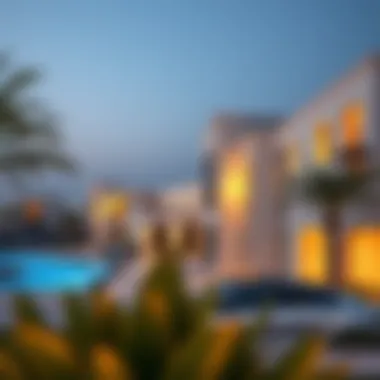

Lifestyle choices heavily influence buyers' decisions on new homes. With Dubai being known for its vibrant living, prospective buyers often seek homes that suit their desired lifestyle. Many buyers now focus on a work-life balance, which can drive them to consider locations near recreational facilities and social hubs.
For example, residents of Dubai Marina might prefer residences that provide aesthetic waterfront views and convenient access to restaurants and nightlife. Alternatively, buyers eyeing Jumeirah Village Circle may cherish its community-driven atmosphere, aligning with families looking for a sense of belonging.
Key lifestyle considerations include:
- Proximity to amenities: Parks, gyms, entertainment zones, and shopping centers matter a lot to younger generations.
- Transportation accessibility: Buyers are keen on how easily they can access public transport, especially as the city grows.
- Sustainability: A growing trend shows an inclination towards eco-friendly homes that lower utility costs while promoting a healthier lifestyle.
In essence, understanding a buyer’s preferred lifestyle elements can help tailor offerings that resonate with them.
Investment Motivations
When it comes to investment in Dubai’s real estate, motivations can vary significantly. Many investors see Dubai as a golden opportunity due to its strategic location and tax incentives for foreign investors. Additionally, a skilled workforce and a booming economy attract considerable interest.
The return on investment (ROI) is a focal point for many buyers. Rental yields in select neighborhoods, such as Downtown Dubai, can be quite promising, often reaching upwards of 7%, depending on the property type and location. Meanwhile, long-term investors might find areas like Dubai South appealing for future growth potential due to upcoming developments and infrastructure projects.
An understanding of investment motivations is profound for ensuring a match between potential buyers’ expectations and market realities.
Other critical factors that drive investment decisions include:
- Market stability: A clear understanding of the economic environment can solidify buyers' confidence.
- Future growth: An expectation of property value appreciation is enticing for many investors.
- Regulatory benefits: Investors are often drawn to properties that provide clear ownership laws and registration benefits.
Understanding these motivations equips realtors and developers with the knowledge necessary to market properties more effectively and to facilitate informed choices among potential buyers.
Neighborhood Insights
Understanding the neighborhoods in Dubai is crucial for anyone looking to buy a home. In this vast city, each neighborhood comes with its own charm and characteristics that cater to different lifestyles and preferences. As a prospective buyer, you want to ensure that the location you select not only aligns with your lifestyle but also offers good investment potential. This section will explore some of the most sought-after and emerging neighborhoods, helping you make an informed decision.
Popular Areas for New Homes
Downtown Dubai
Downtown Dubai stands as a hallmark of luxury and modern living. Known as the heart of the city, this bustling area is home to iconic landmarks like the Burj Khalifa and the Dubai Mall. The key characteristic that draws many to Downtown is its vibrant urban lifestyle, replete with dining, shopping, and cultural experiences right at your doorstep. Many residents appreciate the walkability of the area, making it suitable for those who prefer not to drive.
However, the fast-paced life comes with a price. Downtown Dubai's property prices are among the highest in the city. But for many investors, it is seen as a worthwhile investment given its allure and potential for rental returns. One unique feature of Downtown Dubai is the Dubai Fountain, where spectacular water shows attract crowds nightly, adding to the overall ambiance of the area.
Dubai Marina
Dubai Marina is a waterfront community that epitomizes modern living with an abundance of amenities. The area is famous for its stunning skyline and marina views, making it a favored choice among young professionals and expatriates. What makes Dubai Marina special is its mix of residential towers and leisure options; you can enjoy beach access, dining, and retail, all within walking distance.
One major advantage of living here is the sense of community and the lifestyle it offers. Residents often engage in various outdoor activities and social events. However, the area can be quite crowded, especially during the weekends, which some may find overwhelming. Parking can also be a challenge due to high demand.
Jumeirah Village Circle
Jumeirah Village Circle, or JVC as it’s commonly known, offers a more laid-back atmosphere compared to the hustle and bustle of Downtown or Dubai Marina. This community is designed with family living in mind, featuring parks, schools, and recreational facilities. With a mix of villas and apartments, JVC is often considered as an affordable option for families looking to settle down in Dubai.
The key characteristic of JVC is its community-oriented environment, which can be appealing for buyers with children or preferring a quieter living space. A unique aspect of JVC is its well-planned layout that includes many green spaces. However, some may find its distance from the central business areas a disadvantage, especially if they work in the more commercial districts of Dubai.
Emerging Neighborhoods
Dubai South
Dubai South has emerged as a promising area due to its strategic location near the new Al Maktoum International Airport. This neighborhood aims to be an economic hub, focusing on enhancing both residential and business opportunities. The key characteristic of Dubai South is its master plan, which includes residential, commercial, and logistical components. For buyers seeking a long-term investment, this is a vital aspect.
What makes Dubai South intriguing is its vision for sustainability and smart living. But, as it's still developing, the residential options might not yet match the vibrancy of established neighborhoods, potentially deterring some buyers.
Al Furjan
Al Furjan is often viewed as a hidden gem in Dubai’s residential landscape. This community is characterized by its spacious townhouses and villas, making it an ideal choice for families. Its proximity to major highways allows for convenient access to other parts of Dubai, which can be a significant advantage.
The ongoing development projects in Al Furjan promise a vibrant community atmosphere. However, some residents note that the area can feel a bit isolated due to limited immediate amenities. This could be a consideration for those who aren’t willing to travel too far for everyday needs.
Dubailand
Dubailand is known for its ambitious projects, including theme parks and entertainment centers. This neighborhood stands out for its diverse options in housing, from affordable to luxury villas. For families and adventure seekers, Dubailand offers various attractions nearby, making it a sought-after location.
One distinct feature is the community-centric planning that includes schools and parks tailored for families. While the area is gradually developing, some potential buyers may find the lack of established infrastructure a downside, as it may take time before the area truly flourishes.
Understanding neighborhoods is not just about location; it’s about lifestyle, community, and future potential. This insight can guide better investment choices.
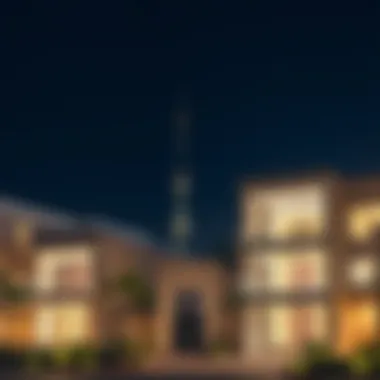

Buying Process for New Homes
Navigating the buying process for new homes in Dubai can seem as complex as solving a Rubik’s cube while blindfolded. However, understanding the steps involved not only simplifies the journey but also helps potential buyers make informed decisions. As one of the most thriving real estate markets globally, Dubai attracts a diverse array of buyers—from investors to first-time homeowners. Knowing the buying process can increase confidence and ensure that you don’t get lost in the maze of regulations and options.
Steps to Purchasing Property
The purchase of a new home starts with laying out the groundwork. Below are the key steps:
- Research: Understanding the market is crucial. Websites like Property Finder and Bayut provide listings and neighborhood insights.
- Budgeting: Establish your financial boundaries. Calculate your income, expenses, and possible mortgage amounts to figure out what you can realistically afford.
- Property Viewings: Take the time to visit various properties. This will help in deciding which area feels like home and aligns with your lifestyle needs.
- Making an Offer: Once you find a suitable home, making a compelling offer can make all the difference. Ensure it’s well-researched and reasonable based on market trends.
- Signing the Agreement: After negotiations, usually, a Memorandum of Understanding (MOU) will be signed, outlining the terms agreed upon.
- Transfer of Ownership: Finally, this involves visiting the Dubai Land Department with relevant documents to complete the transaction. An emotional culmination where dreams become reality.
Legal Considerations
When considering legal aspects, potential buyers must familiarize themselves with local laws governing real estate transactions. This step is essential to avoid any bumps along the road.
Understanding Ownership Laws
In Dubai, ownership laws can be as intricate as a fine tapestry. Foreigners can own property in designated areas under the system known as freehold ownership. This means that buyers gain complete ownership, allowing for leasing or resale.
- Key Characteristic: The ability for expatriates to fully own property in certain developments.
- Unique Feature: This ownership provides a sense of security for long-term investment in Dubai’s fluctuating market.
- Advantages: Homeowners can benefit from capital appreciation and rental income.
- Disadvantages: Navigating the various laws and paperwork can be daunting without proper guidance.
Importance of Property Registration
Property registration in Dubai is not just paperwork; it is vital for the integrity of your ownership. After purchasing, registering with the Dubai Land Department protects your investment.
- Key Characteristic: Legally establishing you as the rightful owner in governmental records.
- Unique Feature: It's essential for selling or leasing your property later on, as it provides legal proof of ownership.
- Advantages: Ensures security and peace of mind, knowing your investment is officially recognized.
- Disadvantages: The registration process includes additional costs and can require meticulous attention to detail.
Financing Options
Exploring financing options is another important facet of the buying process. Knowing what’s available can streamline your path to home ownership.
Mortgage Types in Dubai
When it comes to mortgages, the market offers a variety of options tailored for diverse needs. Common types include fixed-rate loans, which provide stability over time, and variable-rate loans, which may offer lower initial payments but can fluctuate.
- Key Characteristic: Mortgages can cover a range of property values and buyer profiles.
- Unique Feature: Many banks offer financing for up to 80% of the property’s value, creating accessibility for a wider audience.
- Advantages: Potentially allows individuals to own property they might not be able to afford upfront.
- Disadvantages: Long-term financial commitment that requires careful budgeting and planning.
Government Initiatives for Buyers
To stimulate the real estate market, various government initiatives are available to support buyers. From affordable housing schemes to reduced down payment requirements, these options aim to promote homeownership.
- Key Characteristic: Programs that cater primarily to first-time buyers or expatriates, easing entry barriers into the market.
- Unique Feature: Certain initiatives even offer zero or reduced interest loans, potentially making ownership more achievable.
- Advantages: Lower financial obstacles can lead to increased homeownership rates, encouraging investment in the local economy.
- Disadvantages: Some programs might have specific eligibility requirements, limiting access for some buyers.
Understanding the buying process for new homes in Dubai is a necessary step for anyone looking to invest in this vibrant market. Navigating legal aspects, securing financing, and following the proper steps ensure a smoother transition from renting to owning. With the right knowledge, buyers can confidently step into their future dwelling.
Investment Opportunities in New Homes
Investment opportunities in new homes in Dubai present a compelling picture for discerning buyers and investors alike. The real estate landscape in this vibrant city is continuously evolving, providing a diverse array of options that cater to different needs and preferences. Investors have the potential to reap significant rewards, but it’s crucial to consider various aspects, including location, market conditions, and future growth potential.
One key element to understand is how the luxury lifestyle and expatriate influx continually augment the demand for property. With Dubai's reputation as a global business hub and tourist destination, investing in new homes isn't just about the present but also about future growth. As the city expands, new developments reflect innovation and sustainability, key drivers in creating appealing living spaces.
Return on Investment
When contemplating the purchase of a new home, the return on investment (ROI) is a paramount consideration. ROI in Dubai's real estate can be influenced by factors such as rental yields, market appreciation, and the overall economic climate. Currently, Dubai's average rental yields stand at around 6% to 8%, notably higher than many global cities.
Additionally, specific areas like Dubai Marina and Downtown Dubai have shown remarkable appreciation rates over the years. A well-researched investment in these neighborhoods can yield dividends for the astute investor. Moreover, with the ongoing infrastructural developments, properties situated near new metro stations or major roads often appreciate faster, making these opportunities even more enticing.
Rental Market Dynamics
The rental market in Dubai offers a dynamic landscape for investors. The demand for rental properties typically remains strong due to the city's large expatriate community, which accounts for a significant portion of the population. Many newcomers prefer renting rather than purchasing immediately, thus creating a consistent demand for rental homes.
In recent times, the trend has shifted a little; luxury properties have seen significant interest from international investors as second homes or profitable rental ventures. Investors can benefit from short-term rental platforms like Airbnb, which allow flexibility and potentially higher returns. Furthermore, understanding local regulations regarding rentals and the seasonal nature of the market can aid in maximizing profitability.
Market Challenges
Despite the lucrative opportunities, potential investors should be aware of certain market challenges. One significant concern is the saturation of the market in some areas, which can lead to increased competition and pressure on rental prices. Additionally, fluctuations in global oil prices and economic uncertainty can impact buyer sentiment and overall market stability.
Investors must remain vigilant about specific regulatory changes that can affect property ownership and rental agreements. Staying updated with local legislation is vital; for instance, landlords need to comply with recent laws governing tenant rights and property management.
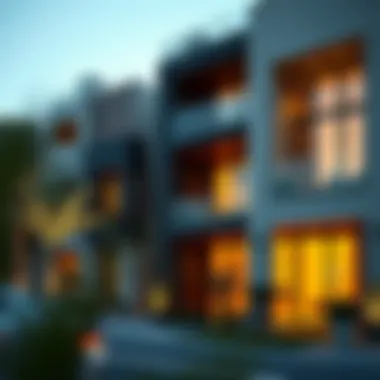

"Investing in real estate is not just about buying property; it’s a long-term commitment that requires careful planning and adaptability to market shifts."
Sustainability in New Home Developments
In the heart of a bustling city like Dubai, the emphasis on sustainability in new home developments stands as a beacon of progressive thought. As potential homeowners and investors become increasingly aware of environmental impacts, integrating sustainable practices in construction and urban living has moved from a niche preference to a necessity. There’s a growing recognition that homes shouldn't just be structures; they should contribute positively not only to the lives of their inhabitants but also to the broader ecosystem. This section explores the importance of sustainability, highlighting its multifaceted benefits and considerations in new home developments.
Green Building Standards
When it comes to establishing a benchmark for sustainable construction, green building standards play a pivotal role. In Dubai, several standards are introduced, such as Estidama, which aims to promote sustainable design and construction practices. These guidelines encourage the use of energy-efficient materials and innovative technologies, ultimately reducing the carbon footprint of new homes.
Benefits of adhering to green building standards include:
- Lower energy costs: Homes designed with energy efficiency in mind often lead to significant reductions in utility bills, providing economic advantages to homeowners.
- Enhanced property value: Sustainable homes frequently attract premium pricing in the market due to their eco-friendly credentials.
- Healthier living environments: Proper ventilation, natural lighting, and the use of non-toxic materials contribute to the well-being of residents.
In essence, embracing these standards allows developers not just to meet regulatory compliance but also to cater to the evolving expectations of a more eco-aware population.
Community Initiatives
Creating sustainable communities goes beyond the mere construction of homes; it involves fostering an environment where residents can thrive together harmoniously with nature. Various initiatives aim to promote sustainability among inhabitants.
For instance, projects like Dubai’s Sustainable City exemplify a commitment to community-led sustainability efforts. They’re designed with self-sufficiency in mind, featuring:
- Solar energy utilization: Homes equipped with solar panels dramatically reduce energy consumption, encouraging residents to take an active role in energy management.
- Waste management systems: Initiatives offer options for recycling and composting, promoting responsibility among residents to reduce landfill contributions.
- Green spaces: By integrating parks and gardens within communities, these developments not only beautify the environment but also foster social interactions and improve air quality.
Aside from improved living conditions, these community-wide initiatives instill a sense of ownership and pride among residents. They remind us that sustainability is not just about individual gain; it’s about contributing to a cohesive, environmentally responsible community.
"Sustainability isn’t just a trend; it’s a testament to our forward-thinking mindset and commitment to future generations."
Ultimately, incorporating sustainability into new home developments marks a significant step toward a greener future, benefiting buyers, investors, and the planet alike.
Technology and Innovations in Home Design
The role of technology in home design goes beyond mere aesthetics; it shapes the very experience of living. As Dubai continues to soar in population and wealth, integrating advanced technology in homes is no longer a luxury—it’s become a necessity. The local real estate market has begun to embrace technological innovations that not only enhance comfort and convenience but also contribute to sustainability and energy efficiency. By understanding these innovations, potential buyers and investors can make informed decisions regarding their investments in new properties.
Smart Home Features
Smart home technology is revolutionizing the way homeowners interact with their living spaces. Devices that link to smartphones or tablets create an ecosystem where control is at the fingertips of the user. Imagine coming home to a house that adjusts its temperature based on the time of day or security systems that allow you to monitor your property remotely. Key features abound:
- Automated Lighting: Set to adapt to natural daylight, automated lighting systems can maximize energy use while creating the perfect ambiance for any occasion.
- Smart Thermostats: These devices learn your habits—such as when you’re home—and adjust the heating or cooling accordingly, leading to substantial energy savings.
- Security Systems: Modern security solutions offer real-time surveillance and alert systems, ensuring peace of mind no matter where you are.
- Voice-activated Assistants: Systems like Amazon Alexa or Google Assistant can control various devices, playing music, setting alarms, or managing schedules at your command.
The integration of these features indicates a shift toward more personalized living environments, with Dubai's developments championing a tech-savvy approach that attracts both young professionals and families.
"Investing in smart home technologies is not just about convenience; it’s also about future-proofing your investment in an ever-evolving market."
Architectural Trends
Architectural innovations go hand in hand with technological advancements in home design. As Dubai’s skyline evolves, so too do the desires of homeowners and developers alike. Today, architecture is focusing on not only how a space looks but also how it performs. Some notable trends include:
- Sustainable Design Practices: More developers are utilizing materials that are environmentally friendly, blending luxury with responsibility. This is particularly important in a city dealing with rapid urbanization and its associated challenges.
- Open-concept Spaces: Homes designed with fluidity in mind allow for greater social interaction and flexible use of space. This reflects a shift in lifestyle preferences.
- Use of Natural Light: Designs that maximize natural lighting contribute to energy efficiency and enhance the mood within homes. Large windows, open balconies, and skylights are becoming more prevalent.
These trends underscore a broadening definition of home, where functionality meets elegance, prompting a change in buyer expectations. The combination of technological integration with evolving architectural designs positions Dubai as a forward-thinking player in the global real estate market.
As the city moves ahead, potential buyers should keep an eye on these innovations. They signify not only luxury but a long-term value that aligns well with modern lifestyles and sustainability objectives.
Cultural Considerations in Home Design
Cultural aspects play a pivotal role in shaping new homes in Dubai, intertwining with architectural styles, interior decor, and even community layouts. Understanding these influences is crucial, especially for investors and developers aiming to cater to the diverse population in the emirate. This section unpacks the essence of Emirati culture and highlights how modern design integrates traditional nuances, ensuring that homes resonate with both the local populace and global residents alike.
Influences of Emirati Culture
Emirati culture, deeply rooted in the traditions of the UAE, infuses home design with distinctive elements. Architecture often reflects the rich heritage, prioritizing functionality while also embracing aesthetic beauty. Key influences include:
- Traditional Features: Many homes incorporate mashrabiya, intricately carved wooden latticework that allows for privacy while enabling airflow. This element not only serves a practical purpose but also enhances the aesthetic appeal of the home.
- Spacious Layouts: The concept of majlis, an area where guests are welcomed, often leads to open floor plans designed for social interaction. Homes are generally built with ample space to accommodate gatherings, showcasing the importance of hospitality in Emirati culture.
- Cultural Symbols: Elements such as geometric patterns, calligraphy, and local craftsmanship can be found adorning walls and facades.
Understanding these cultural influences is vital for anyone looking to buy or invest in property. For example, an appreciation of these elements can enhance property value, making it more attractive to culturally-minded buyers.
"Investors who recognize and respect the cultural heritage in home design often find greater success in the Dubai real estate market."
Integration of Modern Design
As Dubai rapidly evolves into a global city, the integration of modern design with traditional elements becomes more apparent. This blend results in homes that not only reflect the heritage of the region but also accommodate contemporary needs. Here are some key aspects of this integration:
- Smart Technologies: Modern homes increasingly feature smart home systems. These innovations streamline daily routines while ensuring energy efficiency, aligning with sustainability goals—a key priority in Dubai's future.
- Contemporary Aesthetics: Minimalist designs often dominate the new home landscape, showcasing clean lines and open spaces that contrast yet complement traditional building forms and ornamental features.
- Sustainable Materials: The use of local, sustainable materials resonates both environmentally and culturally. Homes that employ these materials not only honor local craftsmanship but also appeal to a growing eco-conscious market.
The effective merging of old and new in home design fosters a unique identity and can attract a broader range of investors, renters, and owners who appreciate both authenticity and modern convenience. By understanding this balance, stakeholders in the Dubai real estate market can navigate their choices with greater insight.







